After starting off the year refreshing some fundamentals of community management, we wanted to spend February taking that one step further and revisit how we define goals. We know that we do need to have a solid foundation to build off of, but if we also do not have a purpose, mission, or strategic goals to guide our decision-making, we cannot create a stable journey or roadmap.
So, in order to discuss how we define our goals in different contexts, we chose to focus the month of February on Defining Goals.
That means that some of our Roundtable Calls, discussions, and conversations in February revolved around how we define goals in many aspects of community management...
February in TheCR Network: Roundtable Calls
Our first call of February focused on an aspect of community that we all have to deal with and we all should be constantly revisiting and building upon: metrics.
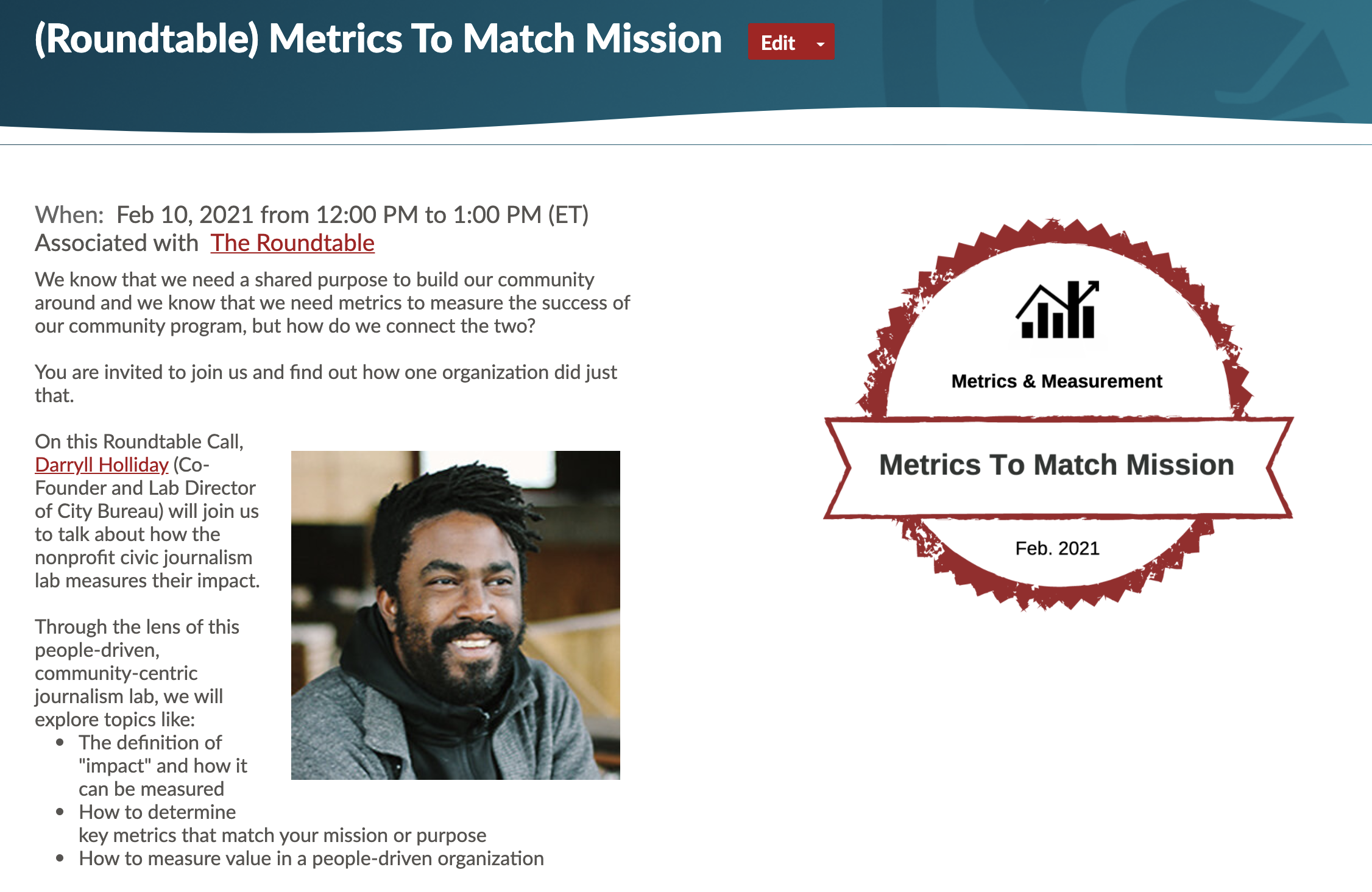
On "Metrics To Match Mission", we were joined by guest facilitator Darryl Holliday (Co-Founder and Lab Director of City Bureau) to discuss how they approach aligning metrics to their overall organizational mission (or shared purpose/shared value).
While this call focused specifically on the use case of a journalism non-profit, there were some great key takeaways that anyone can bring to their community program, no matter the context. In tracking the value of their work through impact metrics (both positive and negative) and identifying metrics that are valuable across the organization through collaborative prioritization, Darryl and the City Bureau team are able to translate metrics like connections made through their stories or an influential partner/organization sharing a story into value metrics.
Because many of City Bureau's metrics focus on anecdotal outcomes, communicating the value of these outcomes has to be translated in order to be seen through a more monetary lens. Because many communities see a lot of their value in the anecdotal analytics, we also need to be able to translate them into more monetary metrics, or at least metrics that show tangible value (like ROI or connect them to business outcomes like retention). This call showed a case study that highlights how one organization does just that and, while their strategies may not directly translate to your context, this is a great example with plenty of inspiration on how you can adapt these ideas to fit your own use case.
If you want to catch up on this call, you can find the Roundtable Report here.
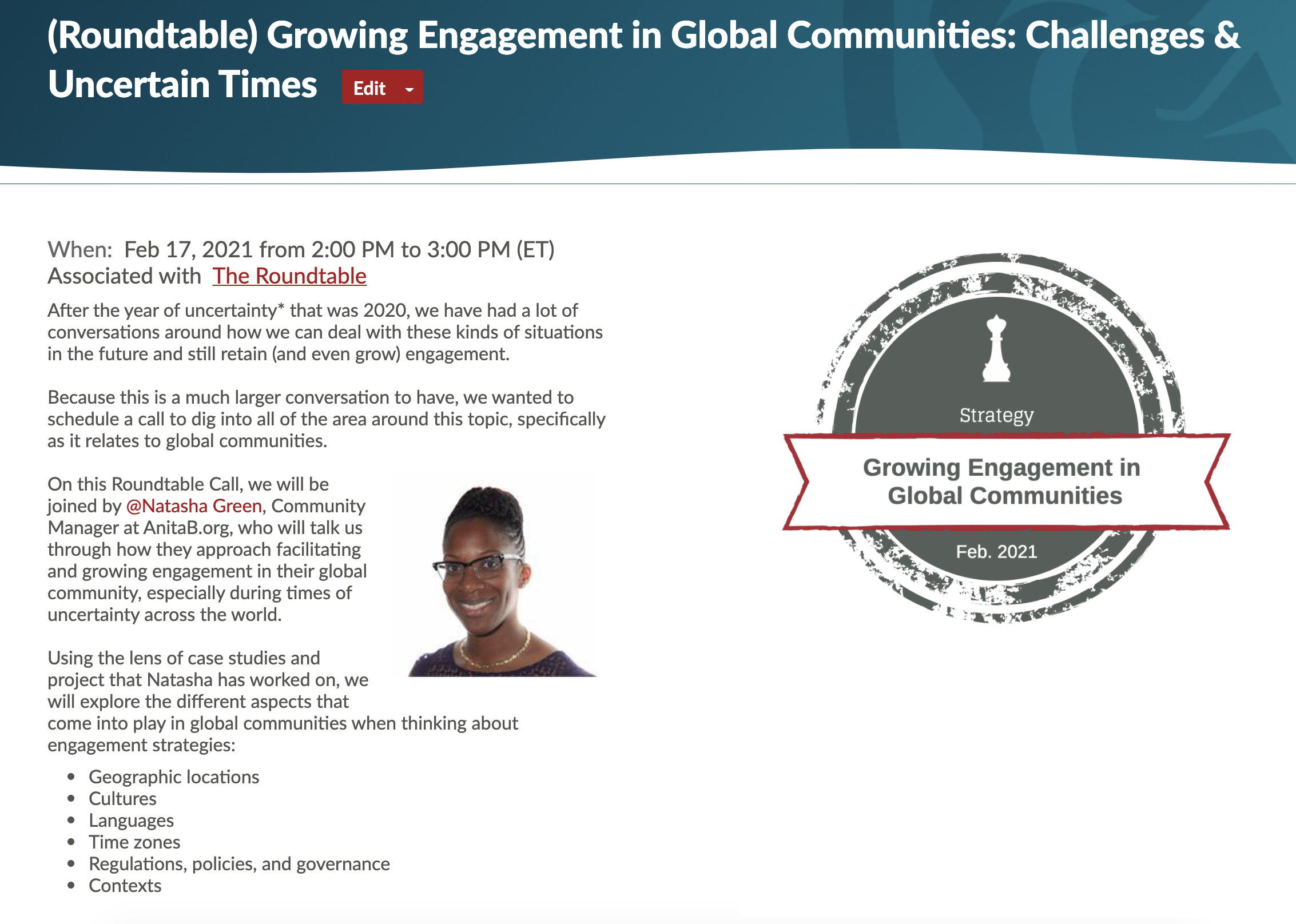
Our second Roundtable Call of the month, "Growing Engagement in Global Communities: Challenges & Uncertain Times", opened up space to discuss how global communities can build engagement with a variety of members across the world, especially during times of uncertainty (like a pandemic, right?).
On this call, @Natasha Green shared some of the strategies that AnitaB.org has implemented in order to engage their diverse group of members across the world on topics around women in STEM. As a community that focused heavily on in-person, off-line engagement, the pandemic forced Natasha and the team to move to virtual spaces and rethink some of the ways that they had been gathering, inspiring Natasha to launch new programs to meet the needs of the community members.
Through leveraging advocates and volunteers, Natasha was able to create multiple new programs that still reflected the mission the AnitaB.org community and actually meet people where they are (both in terms of geographic regions but also through different lockdown restrictions and time zone requirements).
What works for one will not work for all, so creating engagement for different audiences relies on just that, the different audiences, and it is up to you to define your goals and purpose for gathering those people. What are they looking for? Why do you want to engage them? Ask and answer your own version of these questions in order to find your starting place, then get create and experiment!
If you are interested in listening in to this call, you can find the edited Roundtable Recording here.
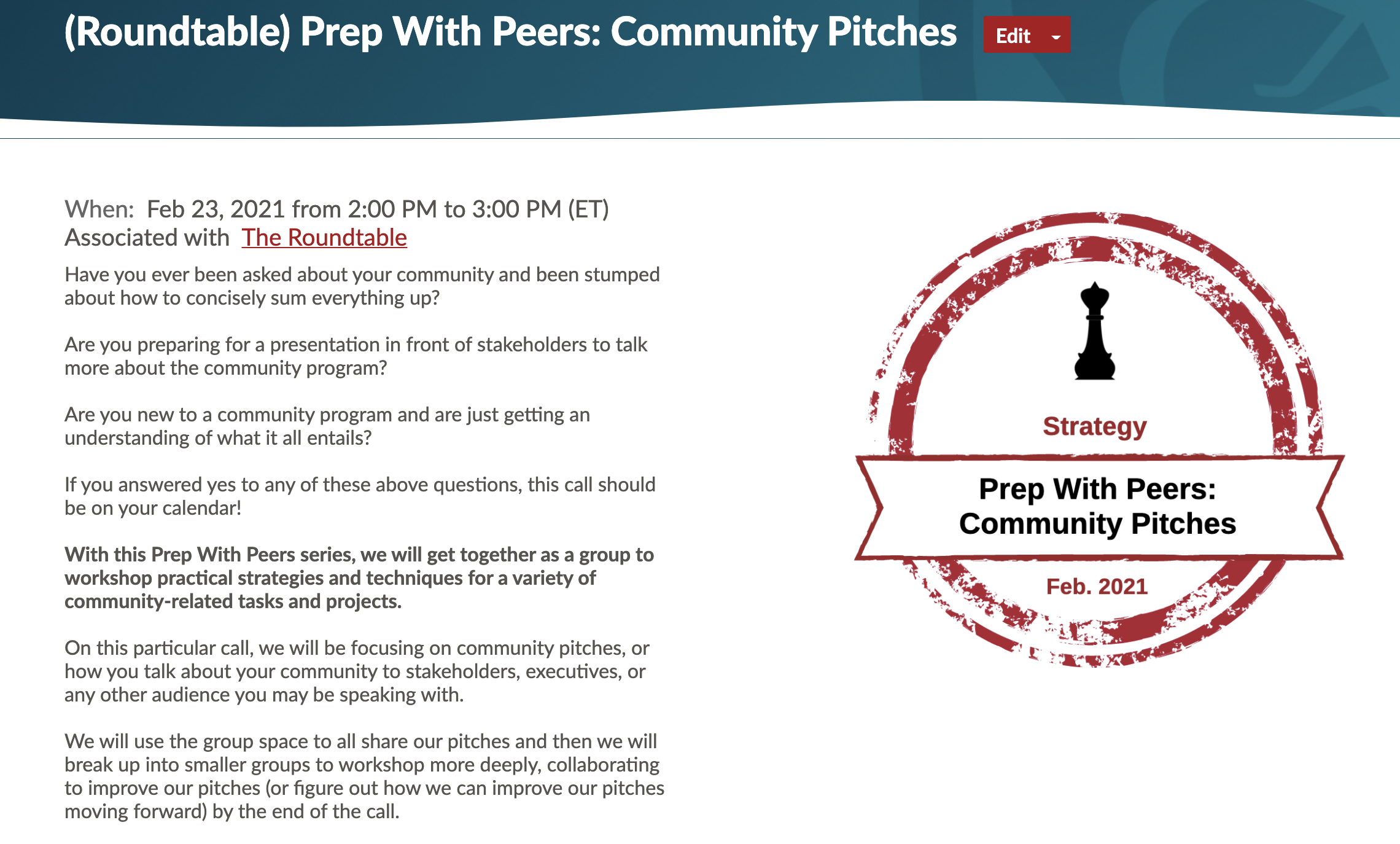
The call, "Prep With Peers: Community Pitches", acted a bit differently than a "traditional" Roundtable Call in that it functioned more as a peer workshop: allowing members to talk with each other and get feedback on how they pitch their communities.
By identifying their audiences and what they intended to say, members were able to then walk through a pitch and get feedback from other members with that context in mind. When we are always having to prove the value of our communities and communicate the purpose internally, this call was a practical exercise in finding the optimal way of doing just that, especially to any specific person or group.
While the pitches themselves were done privately so members had the space to discuss, we did ask everyone to share one key takeaway or practical application they were taking back with them after the call.
To highlight a few of these reflections, one member mentioned looking to add in more details about member benefits to their pitch. Not necessarily numbers and data, but using that to add context and showcase the value for the member and what the community provides that others do not. Another attendee mentioned that they are looking to pitch to members and were reminded to make an emotional connection with people versus solely using numbers and hard information. Lastly, one attendee talked about the value in hearing examples from their peers so that they were able to see the different values that the different paths their community could take would provide. They had not launched a community yet, but through this line of thinking, they are confident in being able to design how to align expectations to the different paths forward.
While this call functioned more as a working session and did not have a finite end or could not be tied up neatly at the end, it got us asking the right questions and working on a task that is always necessary to be thinking about, finessing, and tailoring as knowing the value of our community to the different people involved in it is always important.
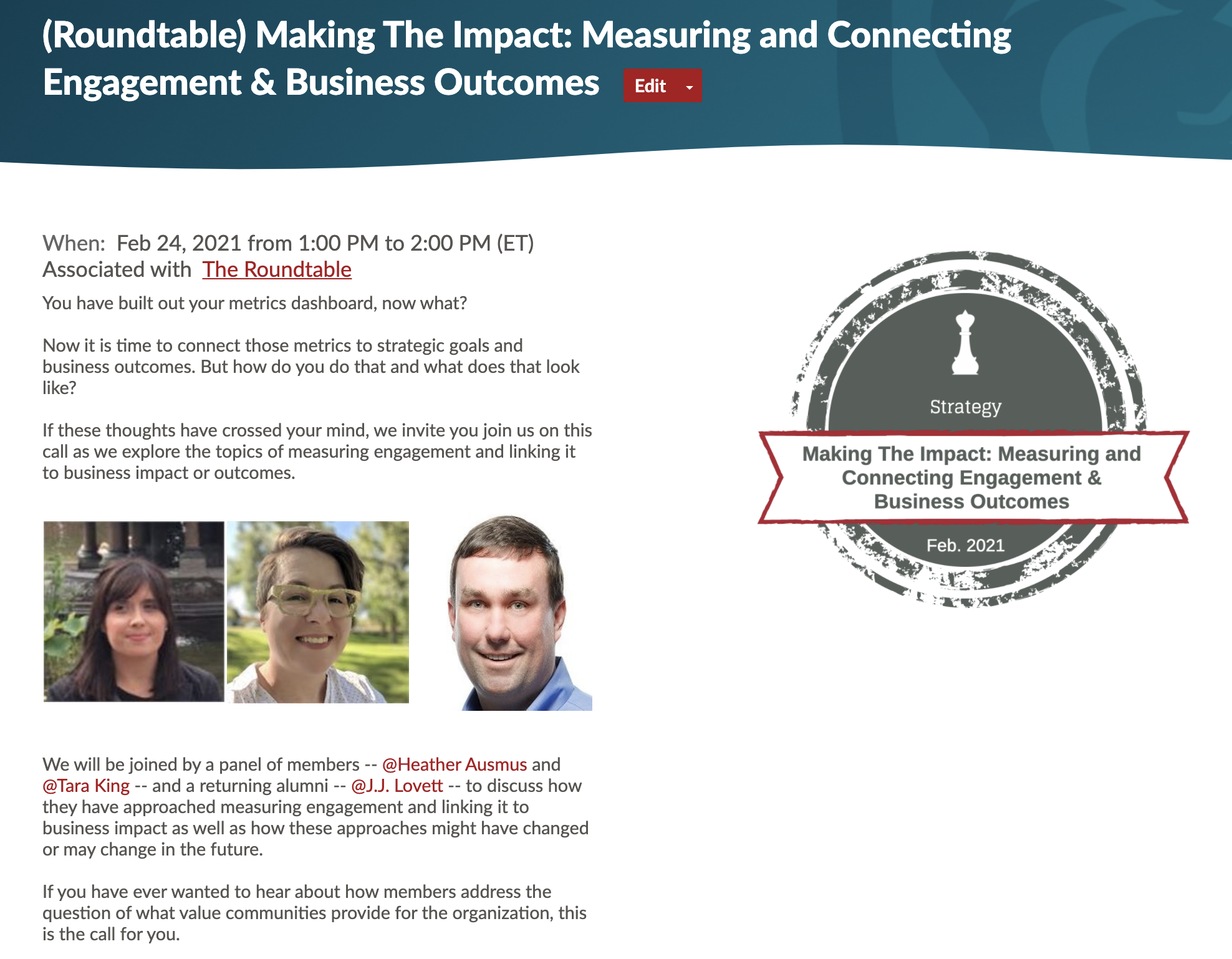
On the Roundtable Call, "Making The Impact: Measuring and Connecting Engagement and Business Value", we were joined by three panelists (two members and one member alumnus) who discussed how they have gone about measuring engagement and connecting it to business outcomes and value.
Because we know many people struggle with this connection, and many are asked for it by stakeholders, we asked these three community professionals what they have seen as they have worked to make these connections and communicate them to their own stakeholders.
One quote that came out of the conversation that also really sums up the conversation is that "community isn't a thing, it's a way of doing business". By integrating that thinking into the entire organization as well as sharing data and collaborating with other functional groups, we can better explain and show the value of community to the business.
Another quote came up when we were discussing communicating this value: "Community data isn't just community data. It's business data."
If we want to show the value that community brings to the organization, we need to be clear in advocating for the relevancy and value of the data we are measuring and reporting. Talk to other areas of the business about their needs and translate this data into a language they understand.
As our panelists still have and had goals for their own metrics reporting, we all know that this is a constant learning and experimental process, where we are all continuing to work to get to that "nirvana" described on the call where we have all of our metrics from all platforms and technologies curated into one place that we can report to everyone. And, until then, we can work to make what we have more efficient and effective.
If you want to listen in on this Roundtable Call, you can find the Roundtable Recording here.
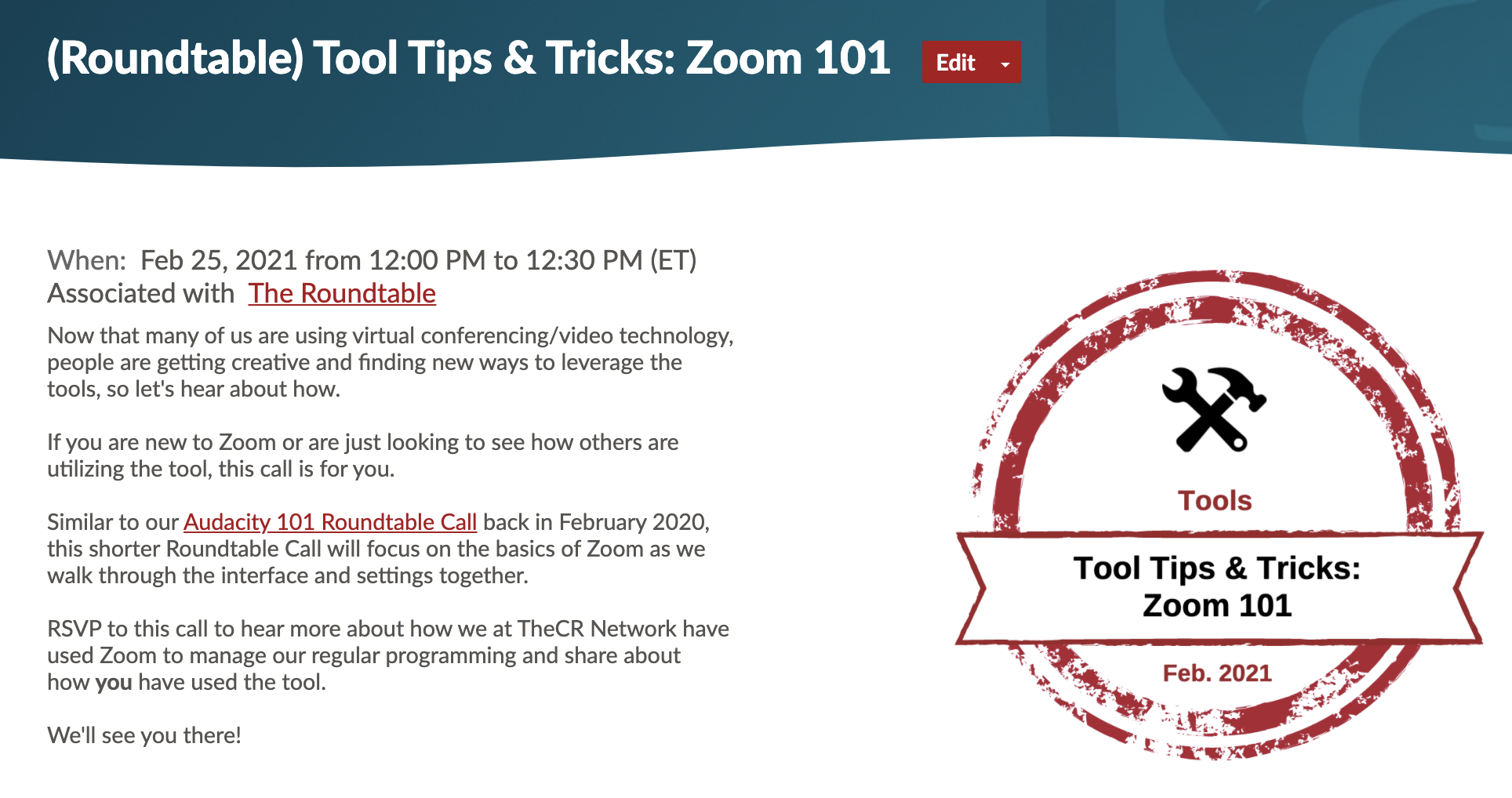
Our last call of February -- "Tool Tips & Tricks: Zoom 101" -- focused on learning something new, or at least getting some basic knowledge on a tool that many are now using or getting very familiar with. While they may not focus on defining a goal, these Tool Tips & Tricks calls are meant to be quick calls to get some fast knowledge on a tool that you can use to work more efficiently.
In this case, we covered the basics of Zoom (specifically focusing on Meetings) and how we can use the tool's functionality to make our Meetings more interesting, engaging, and customized to what we need them to be. And, as we know from our Q4 Community Read, The Art of Gathering, in order to get our gatherings to be meaningful and valuable, we need to have a purpose and design the gathering around the purpose. So, in order to use Zoom in a valuable way, we need to have a goal for the meeting and then design the meeting (customize settings and set up the right structure) to create space for our goal gathering.
While this call was not directly about defining goals, we can still see how tools and technology can help us reach them!
If you want to listen in on this Roundtable Call, you can find the Roundtable Recording here..
We heard some great examples and had some great discussions this month, so why not round it out with what we learned about members of TheCR Network overall...
What Did You Think?
For the month of February, we opened up a poll to get an idea of what topics members of TheCR Network were looking to get more resources on, intending to put together a new resource bundle on the winner over the month of March.
It may not be the most fun poll to see the results of, but it is a great indicator of what members find valuable and want to see more about at the moment, taking the pulse of the community, if you will.
So, what does that pulse look like? Let's see...
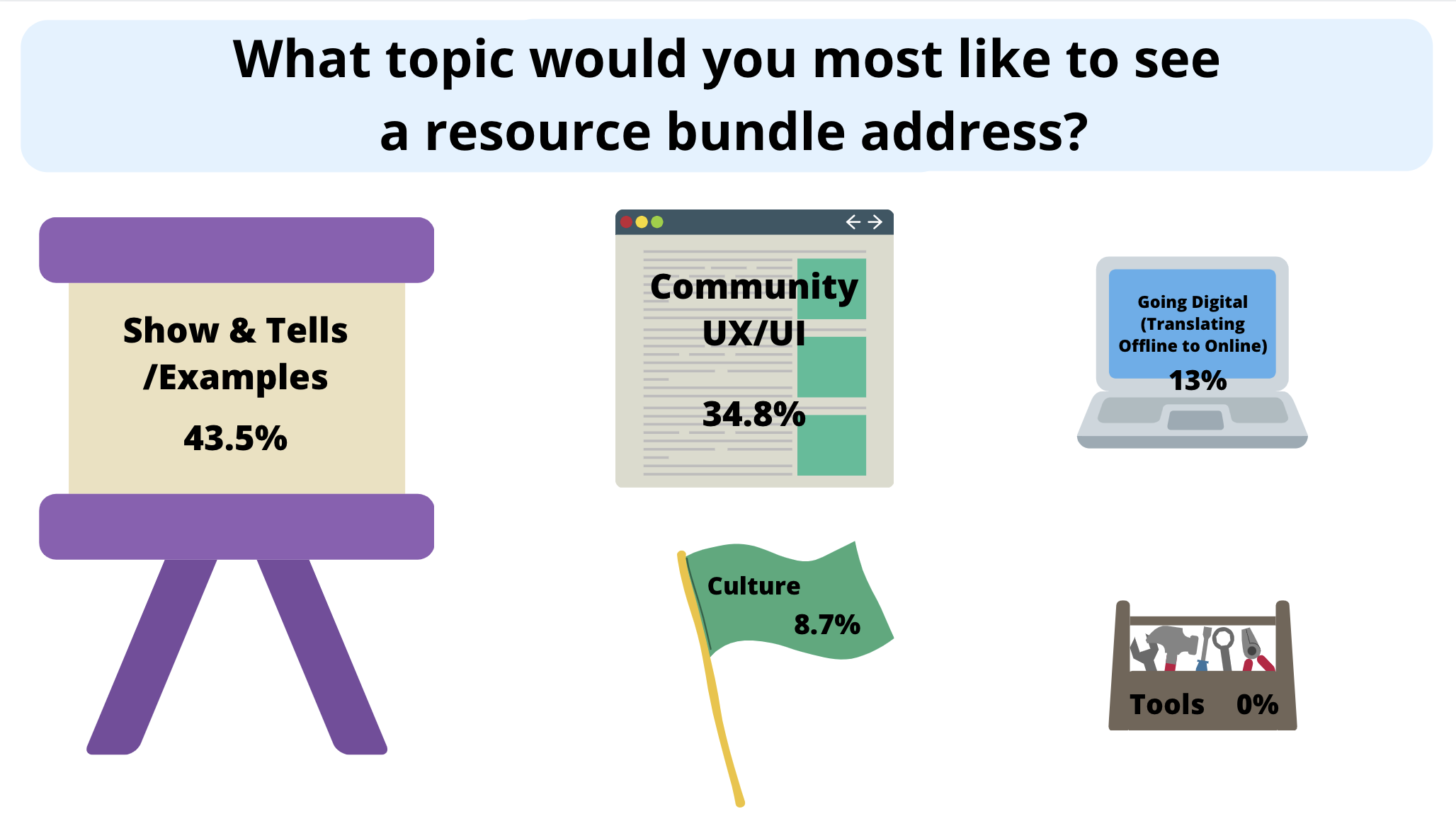
The poll results come from a sample size of 23 respondents and show that members are most looking for examples (43.5%) with Community UX/UI being the second most popular response (34.8%).
This is not surprising as we know it can be extremely valuable to pick the brain of a peer and, through seeing others' work, we can understand how we might apply the same principles to our own. While theory is helpful to define and understand where you want to go or what you want to implement, examples and case studies can be even more helpful in understanding how to do the implementing or even in just cementing the strategies and theories you already know.
To follow up on this poll, TheCR Network team will be adding to our list of Resource Bundles by creating one that focuses on all of the examples (case studies, Show & Tell threads, templates, etc.) that have been shared in the Network and beyond. We are looking forward to launching that in March, so stay tuned!
And speaking of next month, let's look ahead, shall we...
So, Where Do We Go From Here?
Our goal for February was to use January's work reinforcing our foundation to build and define our goals. Through hearing from members and guest speakers about how to we can integrate our mission, purpose, value, and goals into our daily work and strategic planning, we explored our theme in more depth.
So, what do we do with all of this goal-setting?
We take it forward into building the skills we need to reach them. For the month of March, we are looking forward to Building Skills with members and our guests as we look ahead and explore topics like employee, member, and executive engagement, technology, and what makes a Community Manager.
For the rest 2021, we are looking forward to taking these conversations further and digging more into these areas of interest: defining goals, identifying key relationships, exploring metrics, designing programming, and more.
So, if any of these conversations or concepts have sparked an idea or recommendation from you, let us know! While we plan our programming calendar, we also leave space for reactive programming, spur-of-the-moment topics, and member involvement, so leave us a note or send us a message and we'll get something together to address your topics of interest.
And if you're not a member of TheCR Network, or if you know someone who isn't a member of TheCR Network, but would love to participate in these conversations, please reach out! We're happy to talk about how you or they can get involved.
If you'd rather do that yourself, you can find out more about how to join TheCR Network here.